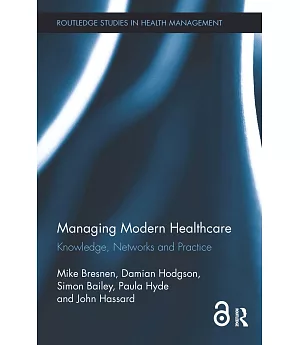Until now, research has given us only a limited understanding of how managers actually make sense of and apply management knowledge; how networks of interaction amongst managers help or
hinder processes of knowledge diffusion and the sharing of best practice; and how these processes are all influenced both by the organisations in which managers act and by the professional
communities of practice they belong to. Managing Modern Healthcare fills these important gaps in our understanding by drawing upon an in-depth study of management networks and practice
in three healthcare organisations in the UK. It draws from the primary research a number of important and grounded lessons about how management networks develop and influence the spread of
management knowledge and practice; how management training and development relates to the needs of managers facing challenging conditions; and how those conditions are themselves shaping the
nature of management in healthcare.
This book reveals how managers in practice are responding to the many contemporary challenges facing healthcare (and the NHS in particular) and how they are able or not to effectively exploit
sources of knowledge, learning and best practice through the networks of practice they engage in to improve healthcare delivery and healthcare organisational performance.
Managing Modern Healthcare makes a number of important theoretical contributions as well as practical recommendations. The theoretical and empirical contributions the book makes relate to
wider work on networks and networking, management knowledge, situated learning/communities of practice, professionalization/professional identity and healthcare management more generally. The
practical contribution comes in the form of recommendations for healthcare management practitioners and policy makers that are intended to impact upon and help enhance healthcare management
delivery and performance.







